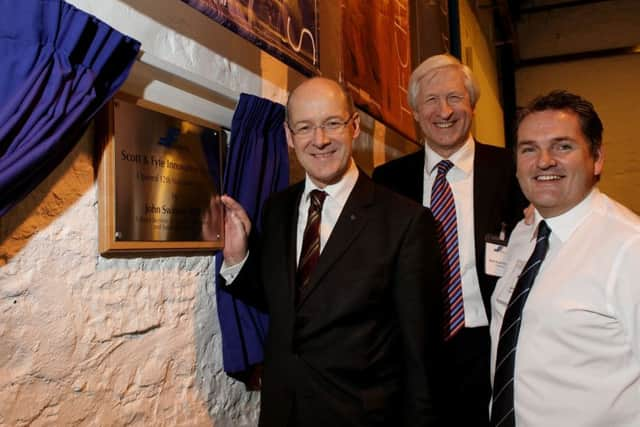How sharing skills is helping Scotland's businesses grow


In a move described as ‘growth with values’, it’s argued that encouraging employees to have their voices heard by sharing new ideas and thoughts will not only lead to a greater sense of workplace satisfaction, but have far reaching benefits for other businesses, across sectors and local communities.
Workplace innovation – in which all employees within a business are encouraged to share ideas and knowledge – has already helped some Scottish firms rethink their approach to their business and led to new, innovative products and sharing of skills.
Advertisement
Hide AdAdvertisement
Hide AdNow more firms are being encouraged to consider adopting the same ‘collective creativity’ approach, when business leaders gather at the second Scotland CAN DO Assembly, which is being held today (11 March) at the Prince’s Trust Wolfson Centre in Glasgow.


The event is being held in Scotland’s themed year for 2016 - the Year of Innovation, Architecture and Design. Organised by the Scottish Government and part of the Scotland CAN DO initiative, it is aimed at inspiring public, private and third sectors to work better together, stimulating a collective ‘can do’ approach at all levels of society and business.
One of the broad range of workshops being delivered on the day will provide practical advice on how to create a workplace environment with empowered individuals and opportunities for innovation . It will be delivered by Peter Totterdill, Chief Executive of UK Work Organisation Network, along with Clare Alexander, Head of Workplace Innovation at Scottish Enterprise.
Clare explained that there’s a strong body of evidence that effective workplace innovation results in increased pace of innovation within organisations, improvements in productivity, efficiency, better employee engagement and utilisation of skills.
“Research also shows that fair work practices – and increasing employee motivation and well-being within the workplace plays a particularly important role in reducing employee stress, enhancing job satisfaction and well being, improving mental health and increasing retention,” she added.


“This in turn feeds into ongoing improvements in innovation, productivity and efficiency, creating a positive and self-perpetuating cycle.”
One business which has adopted this style of deeper employee engagement, is Tayside technical textiles manufacturing firm Scott & Fyfe, which is now 93 per cent owned by an employee benefit trust and seven per cent directly by employees.
Chairman Professor Nick Kuenssberg said creating an innovative workplace has had unexpected results: “We have developed some very exciting new ideas, some of which are taking us directly into new markets we didn’t know even existed.”
Advertisement
Hide AdAdvertisement
Hide AdIt uses four strategic business pods, each featuring a round table – providing a sense of equality for employees – in an area with permanent video and whiteboard tools and space for samples and prototypes. Staff of all levels share and discuss ideas.
“An idea is left there, people can work on it and everyone can see what is happening and critique what’s going on,” he added.
“It’s very much part of the textile plant site and not in offices divorced from what’s going on.”
However, workplace innovation stretches further than simply helping to boost productivity. Some businesses have taken the theme and used employee ideas and collective thinking to enforce links with the local community, bringing much needed skills and creativity to provide help where it’s needed.
As well as shining a spotlight on the benefits of a collective values-based approach, today’s Scotland CAN DO Assembly will also examine the scaling up of Scottish companies, and features presentations from Bob Keiller, AB15, Chair of Scottish Enterprise; Bart Houlahan, co-founder of B-Corps; Irene Graham, CEO of The Scale Up Institute; Robin MacGeachy of Peak Scientific; and Peter Gloor of MIT specifically on that important topic. The event also comes hot on the heels of the launch of the CAN DO Scale programme, a five year high growth entrepreneurial education initiative involving world-class experts from MIT and Harvard.
Ms Alexander added: “Scottish Enterprise is developing a Workplace Innovation Service aimed at helping firms uncover new ways of working to make the best use of all resources- people, processes and relationships – to deliver their objectives while also creating the kinds of workforces which will drive Scotland’s productivity, innovation and competitiveness.”
For more details of the Scotland CAN DO Programme and today’s event, go to cando.scot . Follow @CanDoScotland on Twitter for updates.